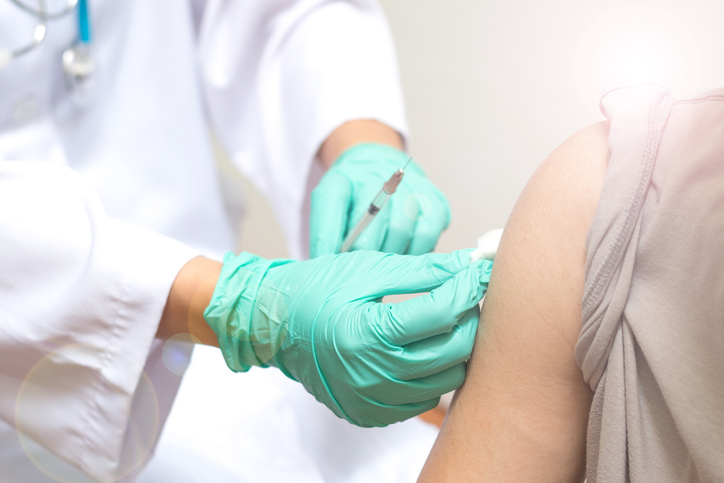
Welcome to this week’s medical news round up! In our latest edition, we bring you the healthcare topics that have been under the microscope over the past week, just in time for your med school applications.
The healthcare topics joining us this week are: measles, junk food and Vitamin D.
Want weekly news delivered straight to your inbox? Sign up to our newsletters here!
Healthcare topic issue: Measles
Recent medical news highlights the rise in measles cases following a decline in uptake of the MMR vaccine as one of the prominent healthcare topics at the moment.
Measles is a highly contagious virus that can lead to very serious complications. Luckily, the MMR vaccine can prevent the disease and is available on the NHS to all children in the UK.
The vaccine is highly effective. In 2016, the UK achieved measles-free status, meaning none of the cases originated in the UK.
However, due to a decrease in the number of children receiving the MMR vaccine, cases have been rising. England and Wales saw cases rise by 707 in 2018 and have seen over 230 cases in the first quarter of 2019.
Prime Minister, Boris Johnson has now called for action to boost vaccination rates, asking social media to “play their part”. In London, estimates suggest 25% of children starting primary school have not received both MMR doses.
What can we learn from this?
The ‘anti-vaccination’ trend is a growing concern, with some calling it a global crisis.
The NHS offers a vaccination programme for children, to protect them from potentially fatal diseases such as polio, measles and diphtheria.
The decline in the vaccination uptake has in turn led to a rise in some of the diseases, particularly measles.
Experts say the decline may be due to complacency, meaning because these diseases are now rare, some do not realise the necessity of the vaccines.
Others say false research from the 1990s connecting the MMR vaccine to autism still has an impact on the public’s decision to vaccinate their children.
Question to think about: Do you think vaccinations should be a compulsory requirement for children attending school?
Read: NHS Hot Topics Questions
Healthcare topic issue: Junk food
Calls to regulate multi-buy price promotions of unhealthy food
The Scottish government are urged to restrict promotions on food and drinks that are high in fat, sugar and salt. Health campaigners say the price reductions encourage the public to buy greater numbers of unhealthy products.
The campaign follows the governments vow to reduce childhood obesity by 50% by 2030. Currently, nearly 30% of adults and 13% of children in Scotland are obese.
Many public health professionals would welcome bold legislation in order to change our relationship with junk food.
However, food industry professionals argue that there is not sufficient evidence to support that restricting promotions would reduce waistlines. They argue that it would only increase weekly food shop costs.
What can we learn from this?
Obesity is one of the largest threats to public health across the country, with many describing it as a public health crisis.
Obesity has strong links to chronic conditions such as diabetes, hypertension and heart disease, as well as other conditions such as cancer.
The debate of who or what is responsible for the obesity crisis is ongoing. The food industry, schools, families, the health service, the government, socioeconomic status and more, the list goes on.
The cause of obesity is multi-factorial and complex. Therefore, the solution also needs to be multi-factorial, with each industry and service involved.
Question to think about: Who do you think should be most responsible for tackling the obesity crisis?
Read Challenges Facing the NHS
Healthcare topic issue: Vitamin D
Study suggests adding Vitamin D to flour
Recent research suggests adding the “sunshine vitamin” to wheat flour could stop 10 million cases of deficiency in England and Wales over the next 90 years, for the cost of 12p per person, per year.
One in five adults in the UK have a vitamin D deficiency. The vitamin is important for our bones and it is widely associated with sun exposure.
The typical UK weather means many are not getting enough of the vitamin between October and April. The NHS recommends everyone should consider taking supplements during autumn and winter.
A deficiency can cause tiredness, sore bones, bone pain and muscle weakness.
What can we learn from this?
Adding supplements to our food is common. Iron is added to flour in the UK by law to prevent conditions, such as anaemia. Many cereals and baby milk formulas also contain extra vitamin D.
Earlier this year the government announced they were considering adding folic avid to flour to prevent birth defects. The decision for this is due to be made next year.
Question to think about: Do you think supplements should be added to common foods and drinks in order to prevent deficiencies?
Read Ethics Questions
Words: Katie Burrell
